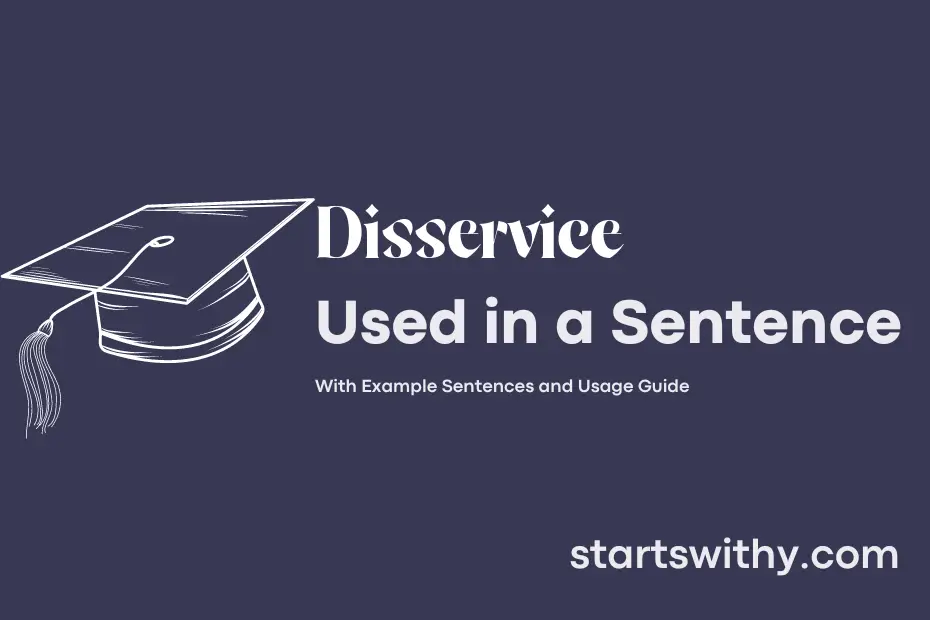Do you know the impact a single sentence can have? Let’s explore the concept of “disservice.” A disservice refers to the act of harming or damaging someone or something, typically by not treating them fairly or by causing inconvenience or harm. It is the opposite of providing a helpful service or benefit.
In various contexts, a disservice can range from a minor annoyance to a significant detriment. Understanding what constitutes a disservice can help us navigate interactions and relationships more thoughtfully, ensuring that we are mindful of the consequences of our actions or words. Let’s delve into the nuances of this concept and see how it plays out in everyday scenarios.
7 Examples Of Disservice Used In a Sentence For Kids
- I did a disservice to my friend by not sharing my toys with them.
- It is important to help others and not do a disservice to them.
- We should always be kind and not do a disservice to anyone.
- Sharing is caring and it helps us avoid doing a disservice to others.
- We can make the world a better place by not doing a disservice to anyone.
- Let’s all work together to spread kindness and prevent disservice.
- Remember, doing a disservice to someone can hurt their feelings.
14 Sentences with Disservice Examples
- It would be a disservice to yourself if you don’t take advantage of the library resources available on campus.
- Balancing a part-time job and a full course load could be a disservice to your academic performance.
- Skipping classes regularly would be a disservice to your education and future career opportunities.
- Relying solely on online study materials without consulting professors could be a disservice to your understanding of the subject.
- Ignoring deadlines for assignments and projects could be a disservice to your grades and overall academic success.
- Not seeking help from tutors or academic support services could be a disservice to your learning and mastery of the course material.
- Using outdated or unreliable sources for research papers could be a disservice to your academic credibility.**
- Being distracted by social media during study sessions could be a disservice to your concentration and productivity.
- Staying up all night before exams without proper rest could be a disservice to your performance and memory retention.**
- Ignoring feedback from professors on your assignments could be a disservice to your growth and improvement as a student.**
- Comparing yourself to others’ academic achievements could be a disservice to your self-esteem and motivation.**
- Taking on too many extracurricular activities at once could be a disservice to your time management and overall well-being.**
- Not networking and building connections with fellow students and professors could be a disservice to your future career prospects.**
- Underestimating the importance of internships and practical experience could be a disservice to your job readiness upon graduation.**
How To Use Disservice in Sentences?
To use the word “Disservice” in a sentence, you can follow these simple guidelines:
-
Understand the Meaning: Before using the word “Disservice,” make sure you know its definition. “Disservice” refers to an action that is harmful or damaging to someone or something.
-
Choose the Right Context: When using “Disservice” in a sentence, ensure that the context fits the meaning of the word. For example, you can say, “Spreading false rumors about someone is a disservice to their reputation.”
-
Placement in a Sentence: “Disservice” is typically used as a noun, so it should be positioned where a noun would naturally fit in a sentence. For instance, “She felt that not informing her friend about the job opening was a disservice.”
-
Be Clear and Concise: When incorporating “Disservice” into your sentence, make sure the sentence is clear and straightforward. Avoid using overly complicated language that may confuse the reader.
-
Practice Makes Perfect: The best way to improve your usage of “Disservice” is to practice incorporating it into different sentences. Try to use the word in various contexts to become more comfortable with its usage.
In summary, using “Disservice” in a sentence involves understanding its meaning, choosing the appropriate context, placing it correctly in the sentence, being clear and concise, and practicing its usage. With these guidelines in mind, you can effectively incorporate “Disservice” into your writing or conversations.
Conclusion
In conclusion, when providing examples of sentences with the keyword “disservice,” it becomes clear that actions or statements that harm or disadvantage others can greatly impact relationships and opportunities. Caution should be taken to avoid causing harm, as it can lead to strained interactions and negative consequences. By recognizing the possible repercussions of such behavior, individuals can strive to communicate and act in ways that promote positive outcomes and harmony in their interactions with others.
Understanding the weight of the word “disservice” in sentences highlights the importance of considering the impact of our words and actions on those around us. By embracing empathy and thoughtfulness in our communication and interactions, we can work towards creating a more supportive and constructive environment for everyone involved, ultimately fostering healthier relationships and mutual understanding.




